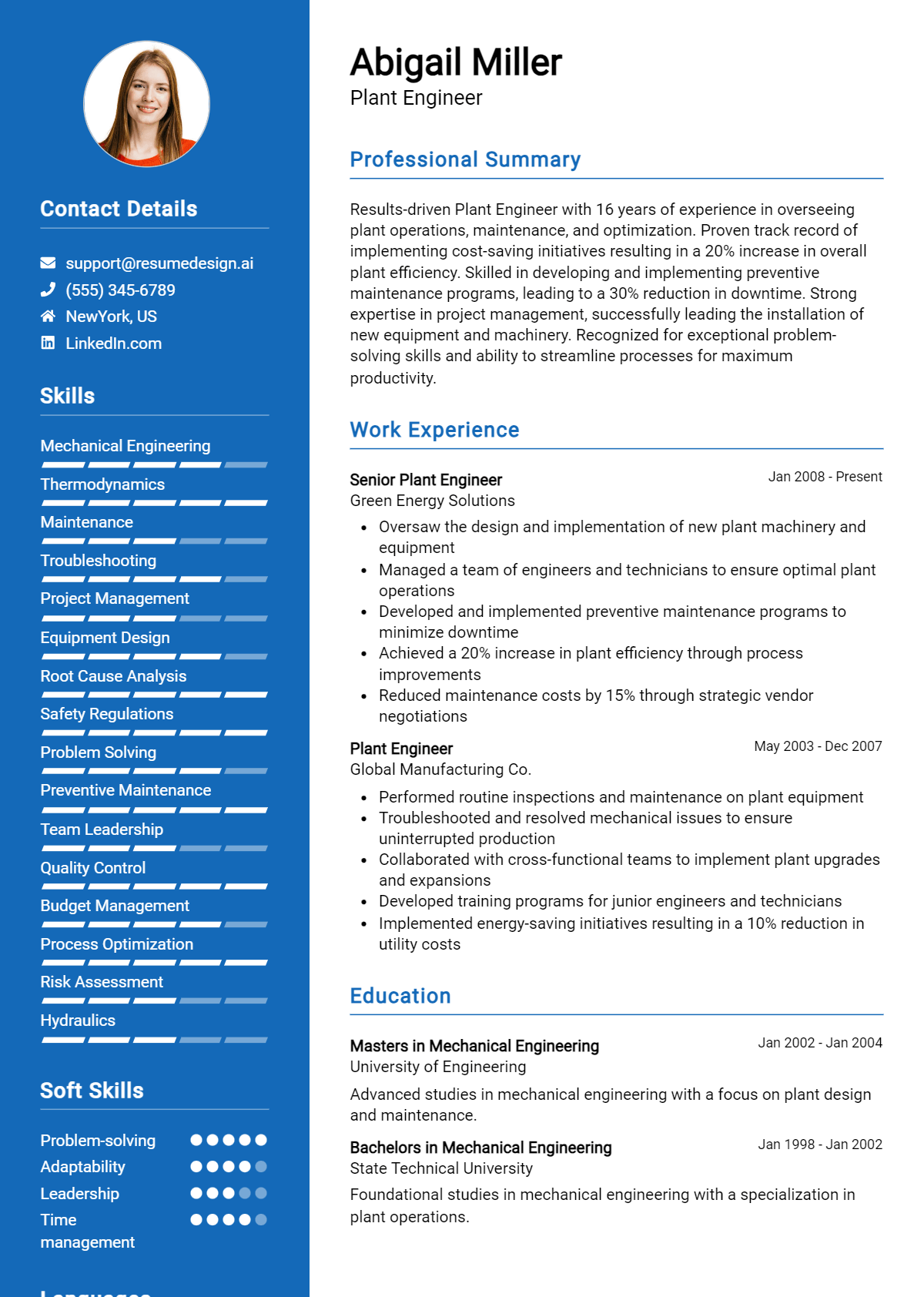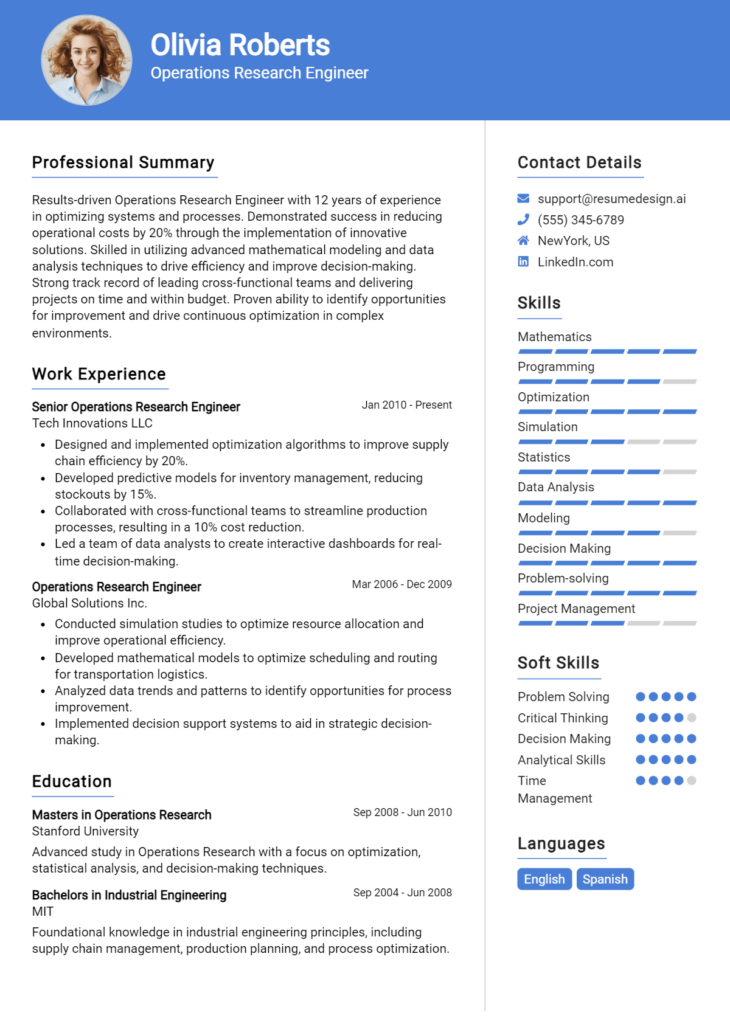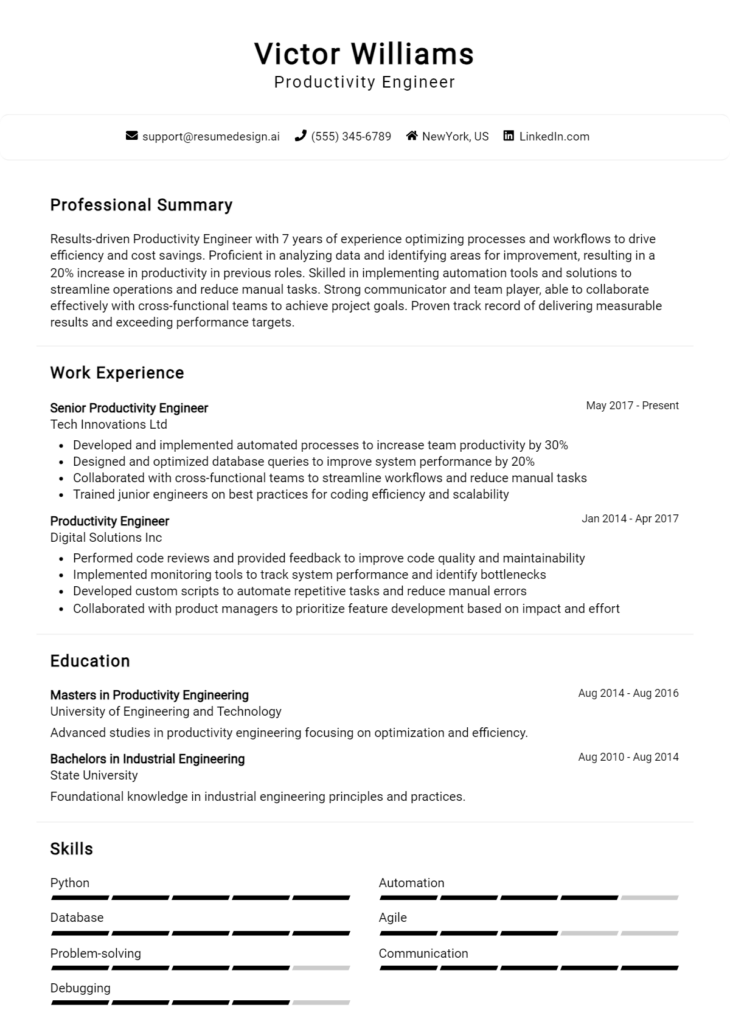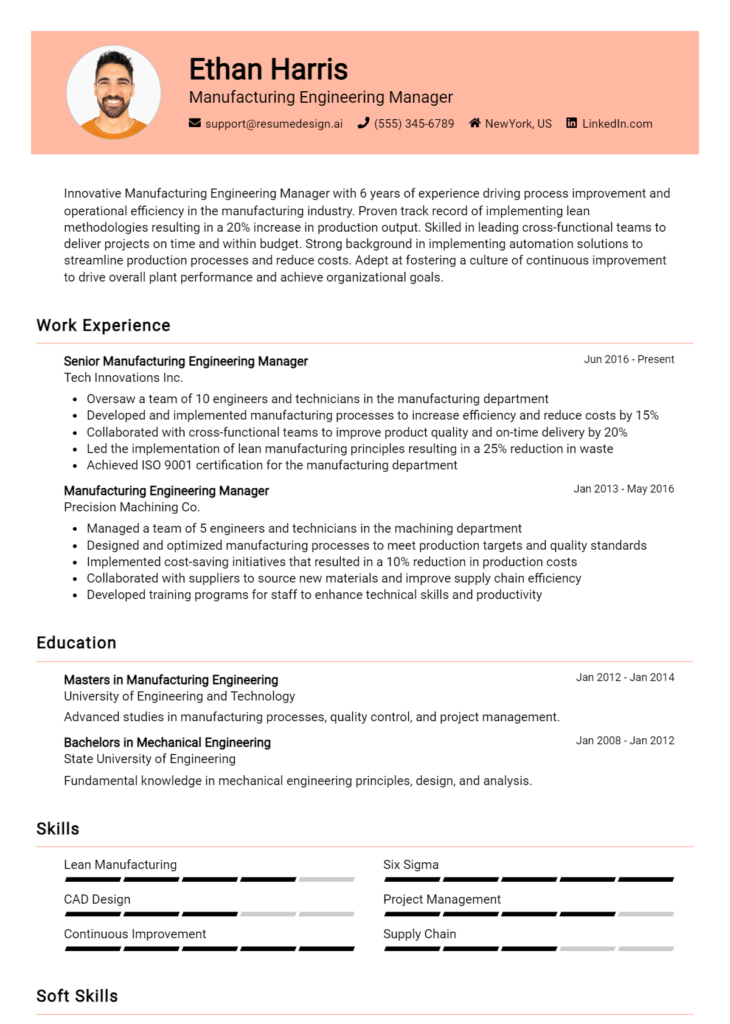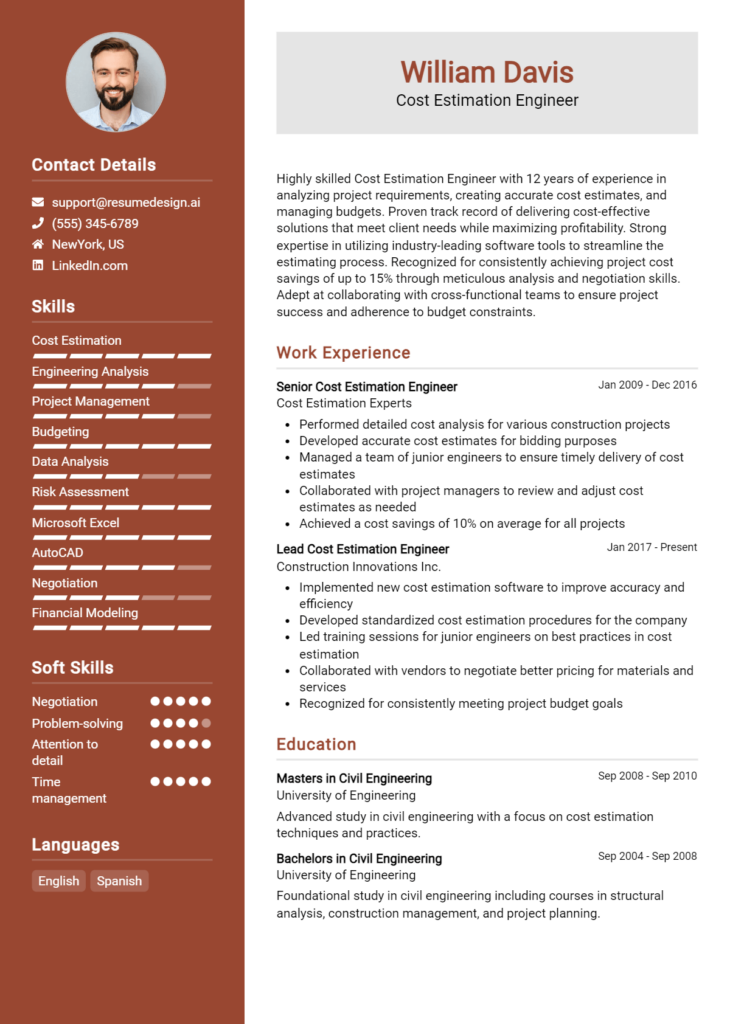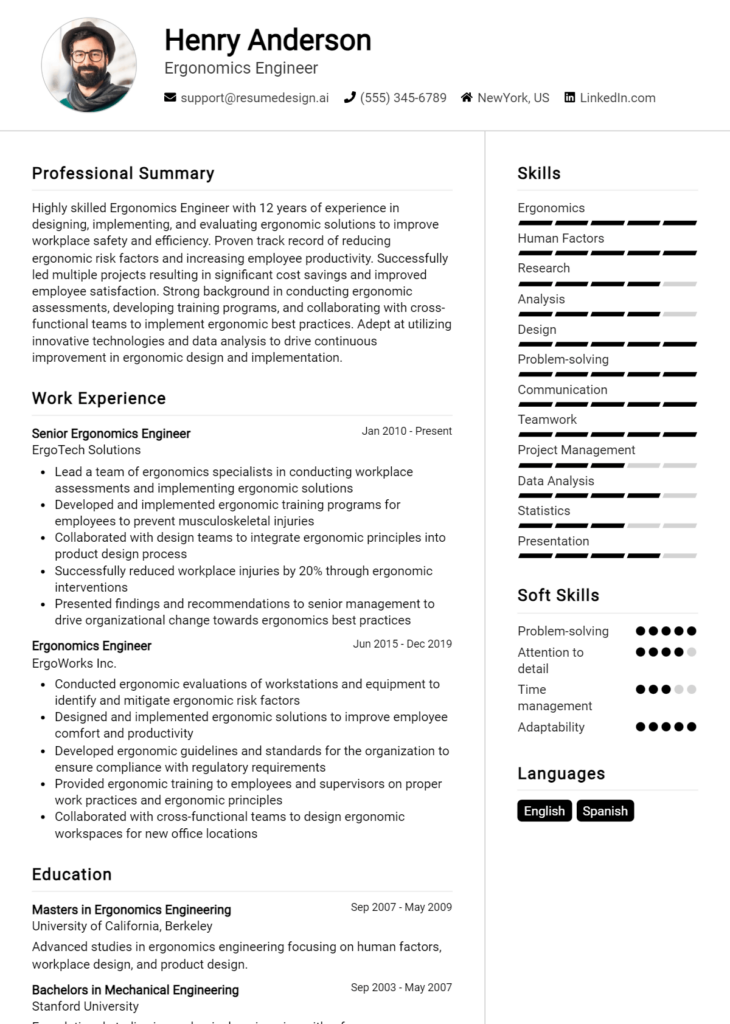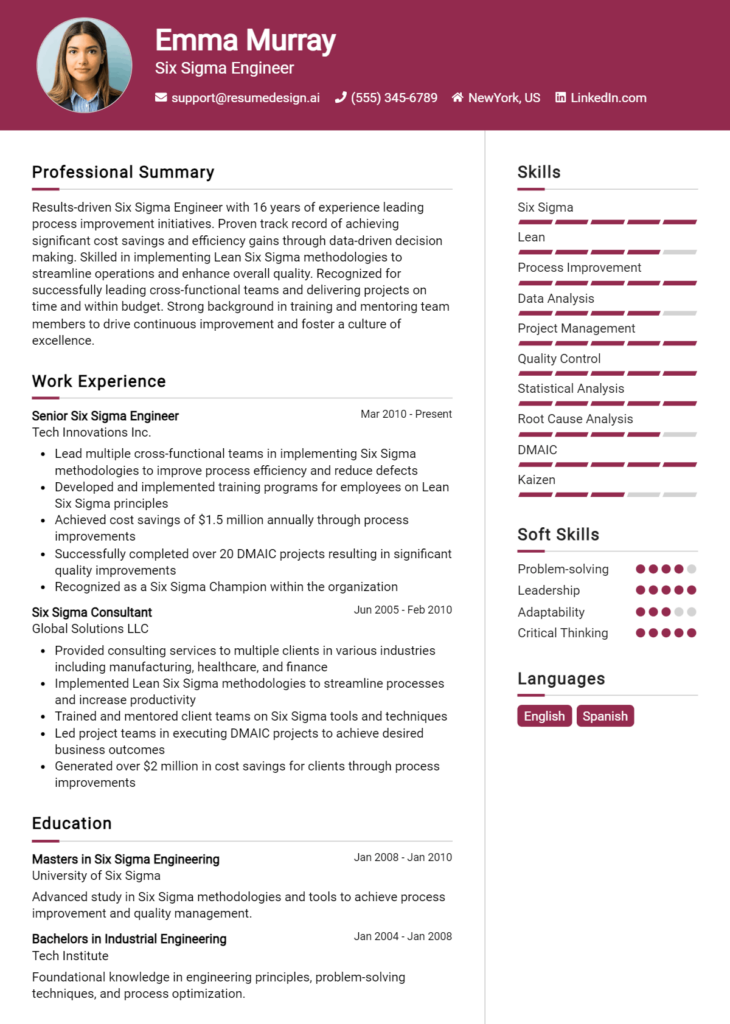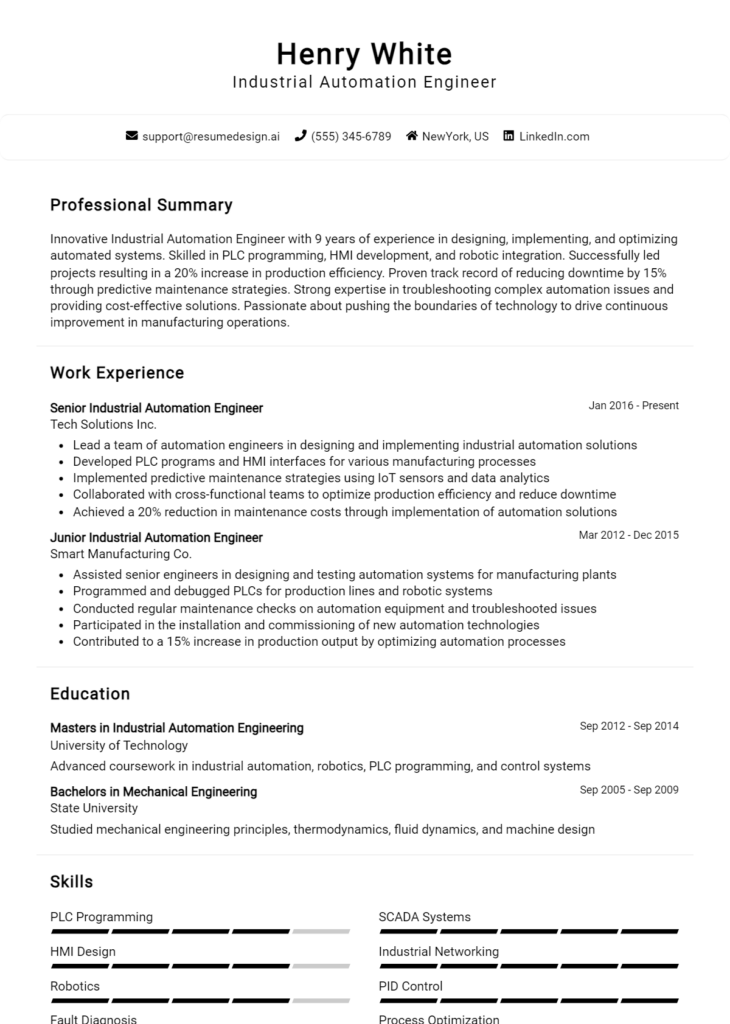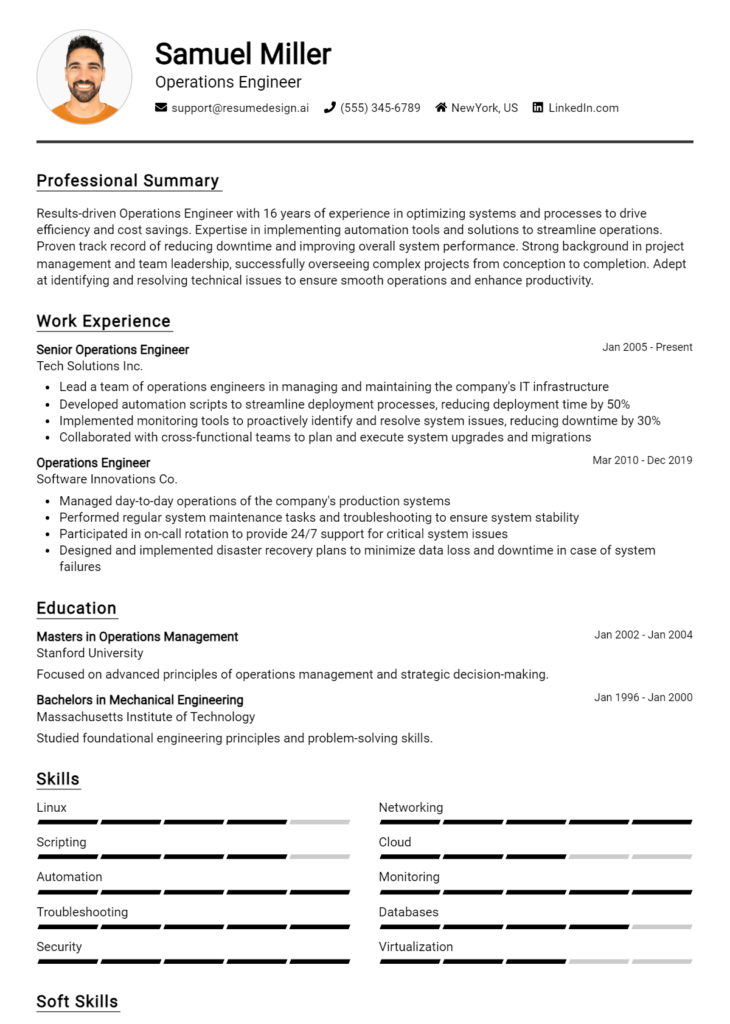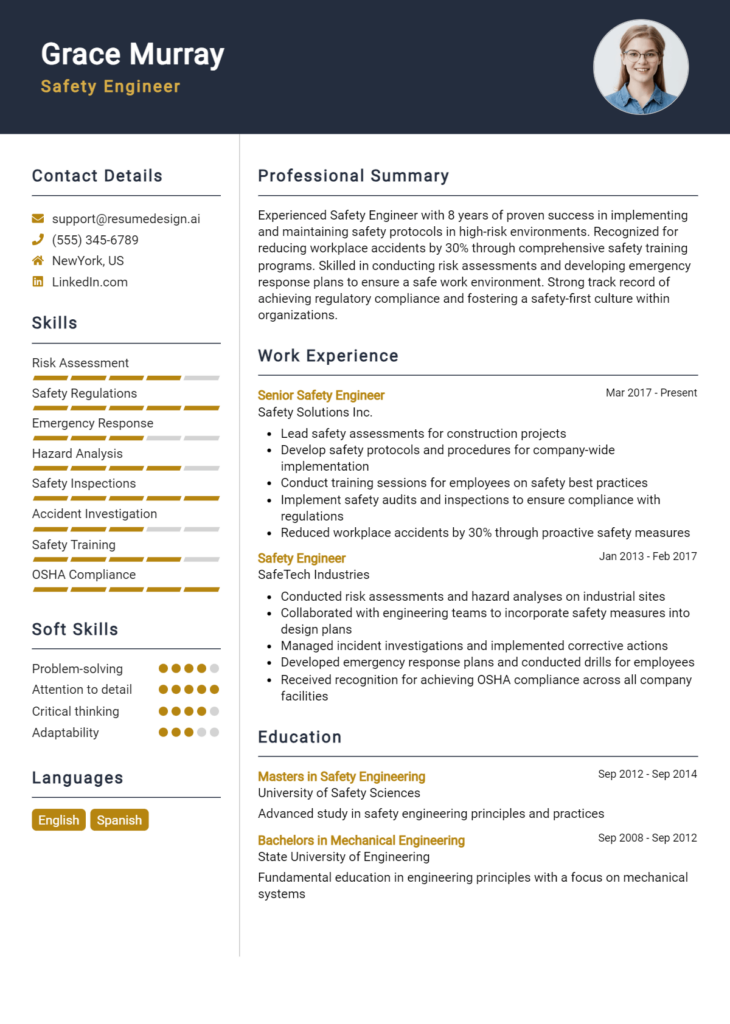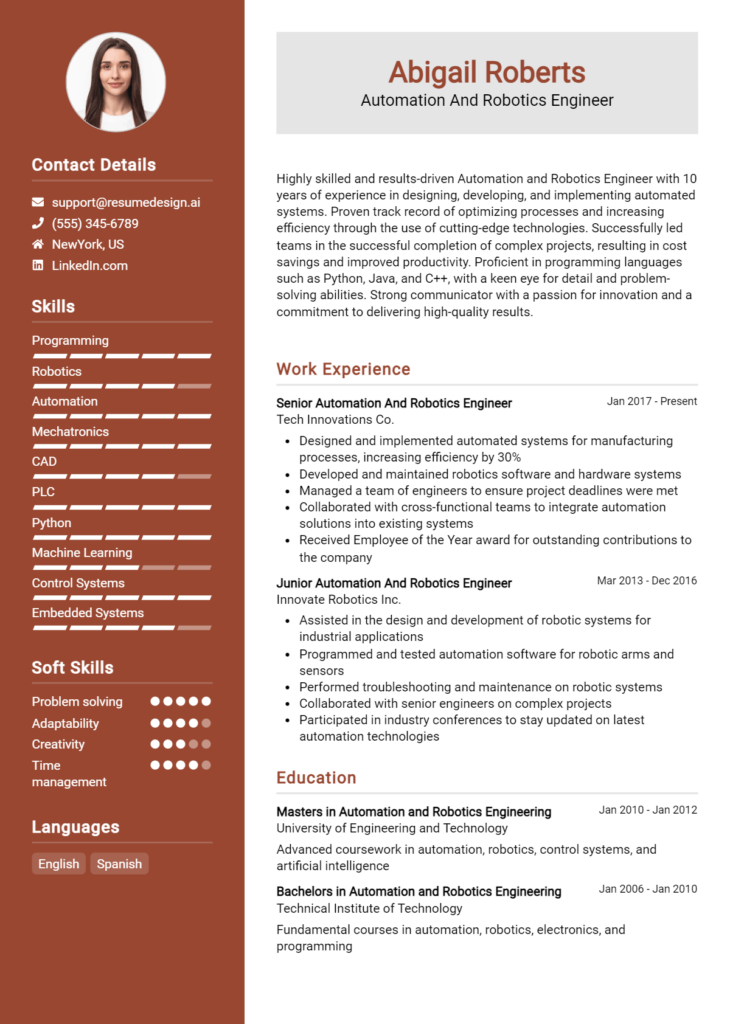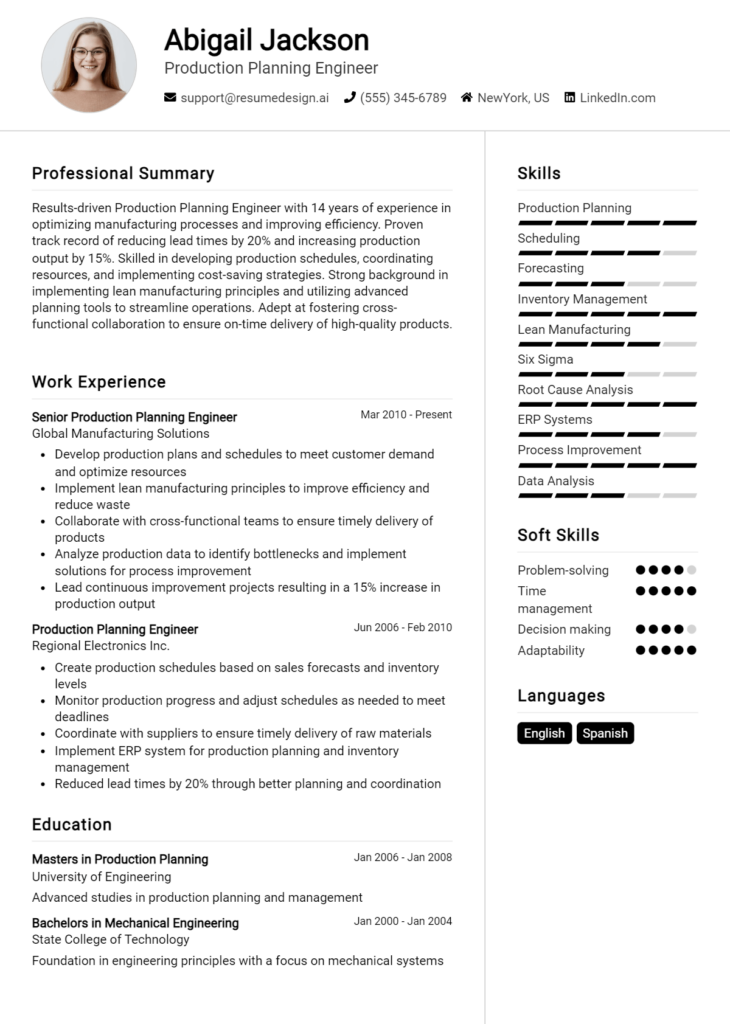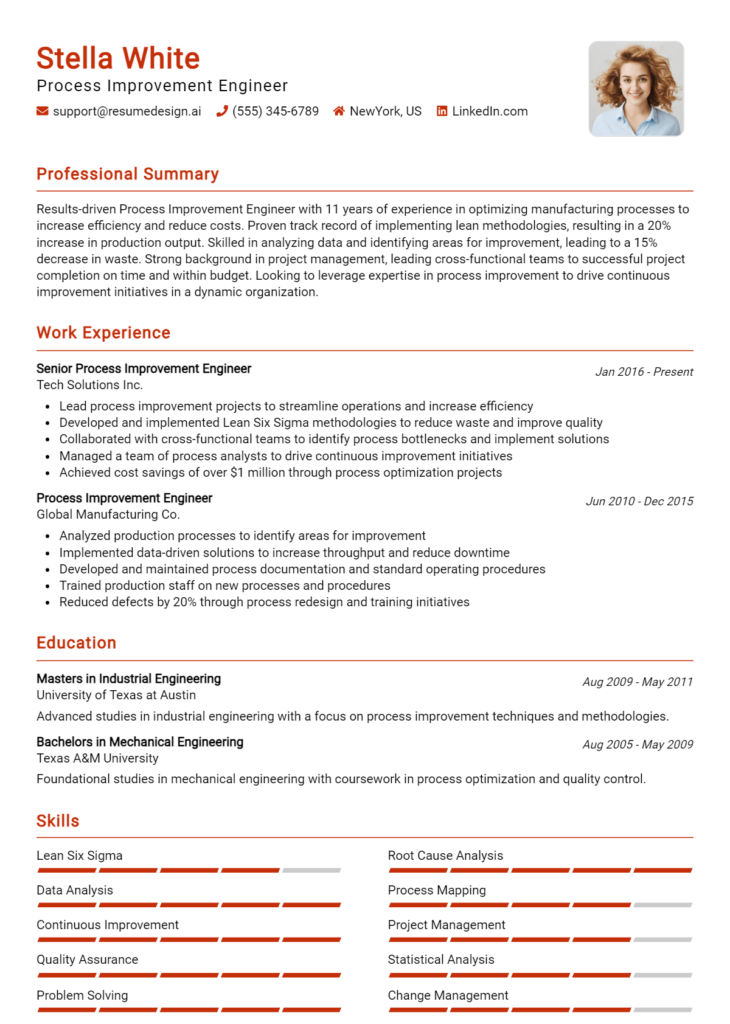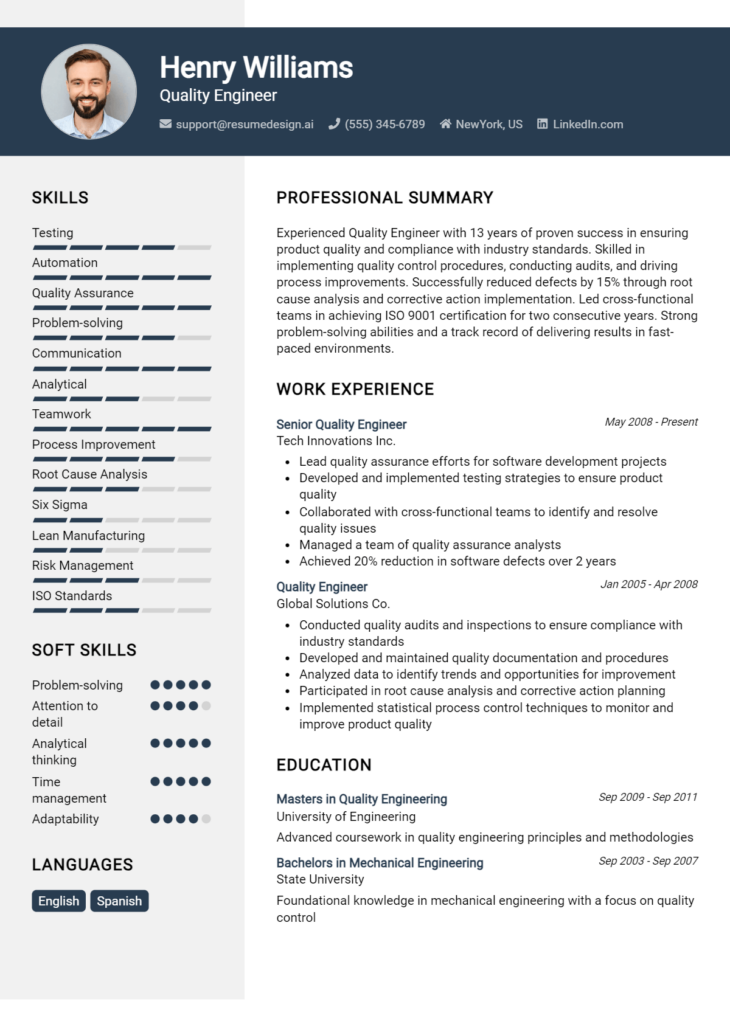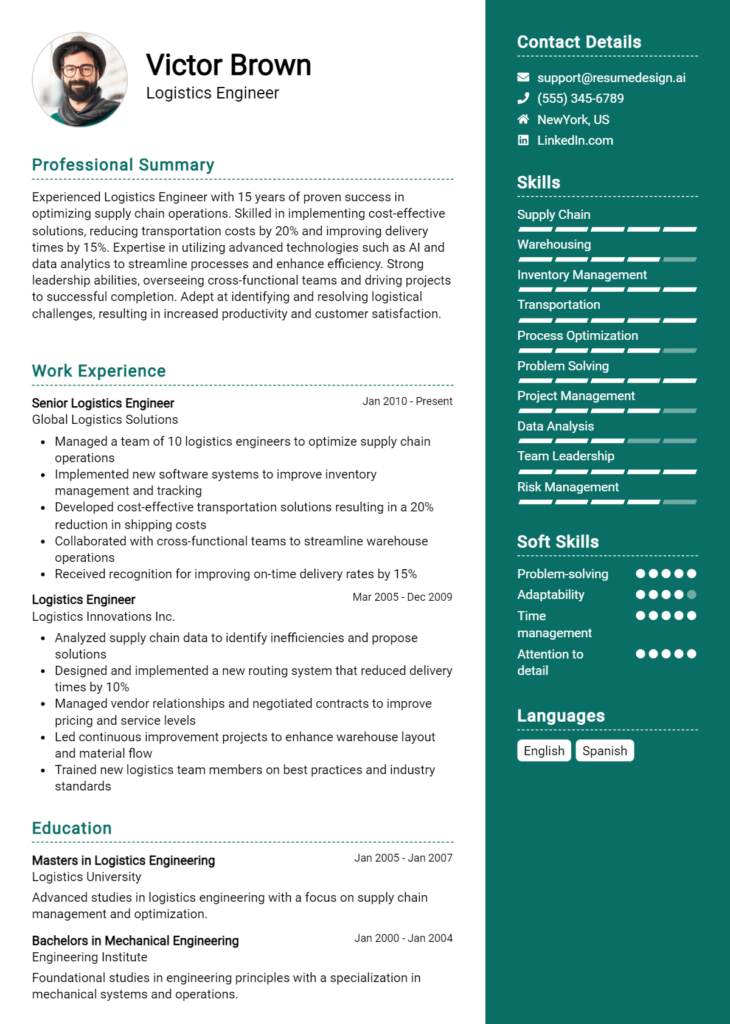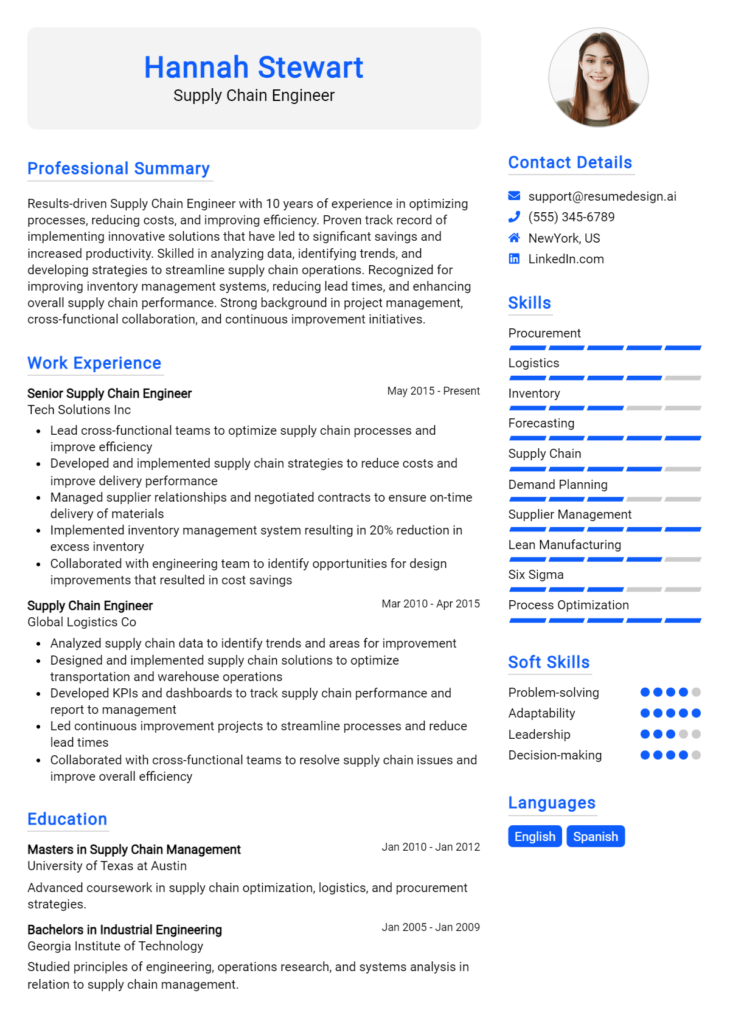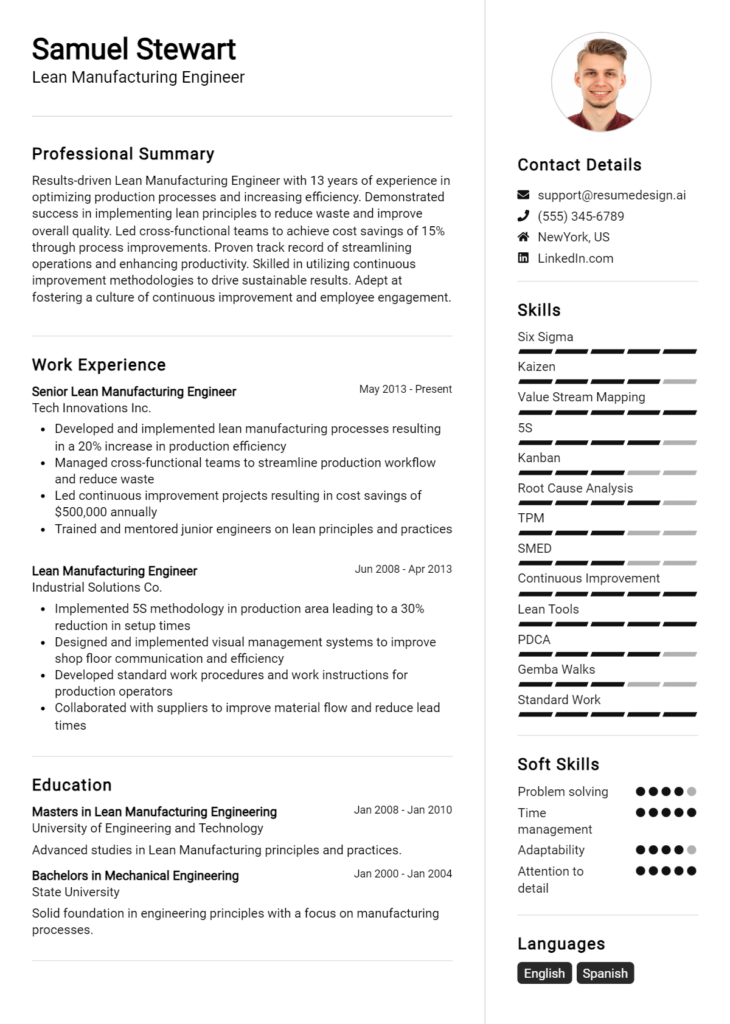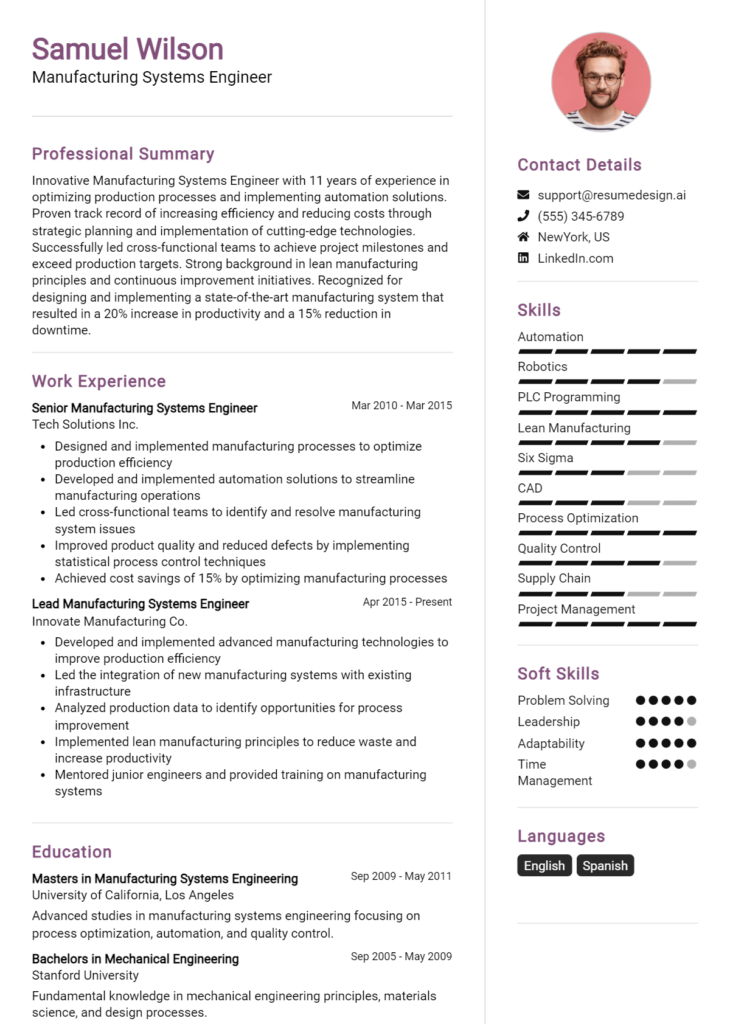Plant Engineer Core Responsibilities
A Plant Engineer plays a crucial role in ensuring the efficiency and safety of manufacturing processes by bridging various departments such as production, maintenance, and quality control. Key responsibilities include overseeing equipment performance, conducting root cause analyses, and implementing process improvements. Essential skills include technical expertise, operational knowledge, and strong problem-solving abilities. These competencies are vital for contributing to organizational goals. A well-structured resume can effectively showcase these qualifications, making it easier for potential employers to recognize the candidate's value.
Common Responsibilities Listed on Plant Engineer Resume
- Design and implement maintenance strategies for production equipment.
- Conduct regular inspections to ensure compliance with safety standards.
- Analyze production data to identify areas for process optimization.
- Coordinate with cross-functional teams to resolve technical issues.
- Develop and manage project timelines and budgets.
- Train staff on equipment operation and safety protocols.
- Prepare technical reports and documentation for management review.
- Implement energy efficiency initiatives to reduce operational costs.
- Oversee the installation of new machinery and equipment.
- Lead root cause analysis on equipment failures and performance issues.
- Ensure adherence to industry regulations and quality standards.
- Maintain up-to-date knowledge of technological advancements in the field.
High-Level Resume Tips for Plant Engineer Professionals
In today's competitive job market, a well-crafted resume serves as a crucial tool for Plant Engineer professionals seeking to make a lasting impression on potential employers. This document is often the first glimpse hiring managers have of a candidate, making it essential that it effectively reflects not only the necessary skills but also the significant achievements that set the candidate apart. A resume should not only convey technical expertise but also demonstrate how previous experiences align with the needs of the prospective employer. This guide aims to provide practical and actionable resume tips specifically tailored for Plant Engineer professionals, helping them craft a document that opens doors to exciting career opportunities.
Top Resume Tips for Plant Engineer Professionals
- Tailor your resume for each job application by closely aligning your skills and experiences with the specific requirements outlined in the job description.
- Highlight relevant experience prominently, focusing on roles that demonstrate your capabilities in plant operations, maintenance, and engineering design.
- Quantify your achievements wherever possible, using metrics such as percentage improvements in efficiency, cost savings, or project completion timelines to showcase your impact.
- Include industry-specific keywords and phrases that reflect your familiarity with plant engineering concepts, tools, and technologies.
- Showcase certifications and licenses pertinent to plant engineering, such as PE (Professional Engineer) licenses or Six Sigma certifications, to enhance your credibility.
- Utilize a clean and professional layout that makes it easy for hiring managers to quickly scan your resume for key information.
- Emphasize soft skills such as teamwork, problem-solving, and communication abilities, which are essential in collaborative plant environments.
- Incorporate a summary or objective statement at the beginning of your resume that succinctly encapsulates your career goals and primary qualifications.
- Keep your resume concise, ideally one to two pages, and focus on the most relevant information that showcases your skills and achievements.
By implementing these tips, Plant Engineer professionals can significantly enhance their resumes, increasing their chances of catching the attention of hiring managers and ultimately landing a job in this dynamic field. A well-structured resume that clearly communicates expertise and achievements can pave the way for exciting career opportunities and growth.
Why Resume Headlines & Titles are Important for Plant Engineer
In the competitive field of engineering, a Plant Engineer's resume must stand out to attract the attention of hiring managers. Resume headlines and titles play a crucial role in this regard, acting as the first impression of a candidate's qualifications. A strong headline can succinctly summarize a job seeker's key strengths and areas of expertise in a single impactful phrase. This concise, relevant, and job-specific statement not only grabs attention but also sets the tone for the entire resume, encouraging the hiring manager to read further.
Best Practices for Crafting Resume Headlines for Plant Engineer
- Keep it concise: Aim for a headline that is no more than 10-12 words.
- Be role-specific: Tailor your headline to reflect the Plant Engineer position you are applying for.
- Highlight key skills: Incorporate essential skills or certifications relevant to the role.
- Use action-oriented language: Start with strong verbs that convey proactivity.
- Incorporate industry terminology: Use keywords that resonate within the engineering field.
- Avoid jargon: Ensure that your headline is easily understandable to a broad audience.
- Be honest and authentic: Represent your true qualifications without exaggeration.
- Focus on value: Emphasize what you can bring to the company or how you can solve their problems.
Example Resume Headlines for Plant Engineer
Strong Resume Headlines
Dynamic Plant Engineer with 8+ Years of Experience in Process Optimization
Results-Driven Plant Engineer Specializing in Lean Manufacturing and Cost Reduction
Innovative Plant Engineer with Proven Track Record in Energy Efficiency Projects
Skilled Plant Engineer with Expertise in Automation and Control Systems
Weak Resume Headlines
Engineer Looking for Job
Experienced Professional
Plant Engineer Seeking Opportunities
The strong headlines are effective because they immediately convey specific expertise and experience, making the candidate memorable. They utilize action-oriented language and relevant keywords that align with the job description, demonstrating a clear understanding of the role. In contrast, the weak headlines fail to impress because they are vague and generic, lacking any distinctive qualities that would capture a hiring manager's interest. Without clear specificity or relevance, these titles do not effectively communicate the candidate's value or suitability for the position.
Writing an Exceptional Plant Engineer Resume Summary
A well-crafted resume summary is essential for a Plant Engineer seeking to make a strong impression on hiring managers. This brief overview serves as a critical introduction, quickly capturing attention by highlighting key skills, relevant experience, and notable accomplishments in the field. A strong summary should be concise, impactful, and tailored to the specific job being applied for, effectively setting the tone for the rest of the resume and positioning the candidate as a strong contender for the role.
Best Practices for Writing a Plant Engineer Resume Summary
- Quantify achievements wherever possible to demonstrate your impact (e.g., reduced downtime by 20%).
- Focus on key skills relevant to the Plant Engineer role, such as process optimization, equipment maintenance, and project management.
- Tailor the summary to match the job description and the specific requirements of the position.
- Use action verbs to convey a sense of initiative and results-oriented performance.
- Keep it concise—aim for 3-5 sentences that deliver maximum punch.
- Highlight any certifications, special training, or unique experiences that set you apart.
- Incorporate industry-specific terminology to demonstrate expertise and familiarity with the field.
- Showcase your ability to work collaboratively across teams and departments to achieve operational goals.
Example Plant Engineer Resume Summaries
Strong Resume Summaries
Results-driven Plant Engineer with over 8 years of experience in process optimization and equipment reliability. Successfully led a project that decreased production downtime by 25%, saving the company $500,000 annually. Expert in Lean Manufacturing principles and skilled in cross-functional team leadership.
Dedicated Plant Engineer with a strong background in automation and control systems. Achieved a 30% increase in efficiency by implementing advanced monitoring technologies. Holds a Six Sigma Green Belt certification and has a proven track record of reducing operational costs while enhancing safety standards.
Dynamic Plant Engineer with 10 years of experience in managing facility operations and maintenance. Spearheaded a comprehensive training program that improved team performance by 40%. Proficient in CAD software and project management methodologies, ensuring timely project completion within budget constraints.
Weak Resume Summaries
Plant Engineer with various skills and experiences looking for a new opportunity. I have worked in different industries and am ready to contribute.
Experienced engineer seeking to leverage my background in plant operations. I am a team player and willing to learn new things.
The examples provided illustrate the distinction between strong and weak resume summaries. Strong summaries effectively showcase quantifiable achievements, specific skills, and a clear connection to the role, making them compelling to hiring managers. In contrast, weak summaries tend to be vague, lacking measurable outcomes and appearing too generic, which diminishes their impact and fails to capture attention.
Work Experience Section for Plant Engineer Resume
The work experience section of a Plant Engineer resume is vital as it serves as a comprehensive showcase of the candidate's technical skills, project management capabilities, and ability to deliver high-quality products. This section offers concrete evidence of past accomplishments, demonstrating how the candidate has successfully applied their engineering knowledge in real-world scenarios. By quantifying achievements and aligning experiences with industry standards, candidates can effectively illustrate their value to potential employers and highlight their readiness to contribute to the success of the organization.
Best Practices for Plant Engineer Work Experience
- Focus on quantifiable results, such as percentage improvements in efficiency or cost reductions.
- Highlight specific technical skills and expertise relevant to the job description.
- Create bullet points that demonstrate leadership in managing teams and projects.
- Use action verbs to start each bullet point, demonstrating proactivity and impact.
- Align your experiences with industry standards and best practices to show familiarity with relevant benchmarks.
- Include collaborative efforts, underscoring your ability to work effectively with cross-functional teams.
- Tailor the work experience section to match the requirements of the position you are applying for.
- Keep descriptions clear and concise, avoiding jargon that may not be understood by all readers.
Example Work Experiences for Plant Engineer
Strong Experiences
- Led a cross-functional team to implement a new production line, resulting in a 30% increase in throughput and a 15% reduction in operational costs.
- Developed and executed a maintenance schedule that decreased equipment downtime by 25%, directly contributing to an annual savings of $100,000.
- Managed a project to upgrade automation systems, which improved product quality and reduced error rates by 20% within six months.
- Collaborated with R&D to design a new product line, successfully launching it on time and achieving sales targets exceeding projections by 50% in the first quarter.
Weak Experiences
- Responsible for overseeing plant operations and ensuring everything ran smoothly.
- Worked on various projects and contributed to team efforts as needed.
- Assisted in maintenance tasks and helped with equipment checks.
- Occasionally participated in meetings to discuss production issues.
The examples categorized as strong experiences effectively highlight specific achievements and quantifiable results, showcasing the candidate's technical leadership and collaboration skills. In contrast, the weak experiences lack detail and measurable outcomes, making them less impactful and failing to demonstrate the candidate's true capabilities in a competitive job market.
Education and Certifications Section for Plant Engineer Resume
The education and certifications section of a Plant Engineer resume is pivotal in establishing the candidate's qualifications and expertise in the field. This section not only showcases the academic background but also highlights industry-relevant certifications that illustrate the candidate's commitment to professional development and continuous learning. By providing detailed information about relevant coursework, specialized training, and recognized certifications, candidates can significantly enhance their credibility and demonstrate their alignment with the requirements of the Plant Engineer role.
Best Practices for Plant Engineer Education and Certifications
- Focus on relevant degrees in engineering, such as Mechanical, Electrical, or Chemical Engineering.
- Include certifications from recognized bodies, such as the Certified Plant Engineer (CPE) or Six Sigma certifications.
- Provide details of specialized training or workshops that pertain to plant operations or engineering technologies.
- List relevant coursework that enhances your qualifications and relates directly to the job description.
- Use specific dates to indicate the completion of degrees and certifications to demonstrate recent learning.
- Highlight any honors or distinctions received during your educational journey to stand out.
- Keep this section concise but informative, ensuring all listed qualifications are applicable to the desired position.
- Update your education and certifications section regularly to reflect new qualifications as you continue to grow professionally.
Example Education and Certifications for Plant Engineer
Strong Examples
- Bachelor of Science in Mechanical Engineering, University of Engineering, Graduated May 2022.
- Certified Plant Engineer (CPE), Association for Facilities Engineering, Earned March 2023.
- Six Sigma Green Belt Certification, American Society for Quality, Completed June 2021.
- Advanced Process Control Training, Institute of Chemical Engineering, Attended September 2022.
Weak Examples
- Bachelor’s Degree in Business Administration, University of Business, Graduated May 2019.
- Certification in Basic Computer Skills, Online Learning Platform, Completed January 2020.
- High School Diploma, Local High School, Graduated June 2017.
- Outdated certification in First Aid and CPR, American Red Cross, Earned 2015.
The strong examples are considered commendable because they reflect relevant qualifications that directly relate to the Plant Engineer role, showcasing both the necessary educational background and industry-recognized certifications that demonstrate expertise. Conversely, the weak examples are inadequate as they contain irrelevant degrees and certifications that do not contribute to the candidate's qualifications for a Plant Engineer position, highlighting the importance of relevance and specificity in this section.
Top Skills & Keywords for Plant Engineer Resume
As a Plant Engineer, possessing a well-rounded set of skills is crucial for both your resume and your career advancement. The right mix of hard and soft skills can not only help you stand out in a competitive job market but also demonstrate your ability to handle the complexities of the role. A Plant Engineer is responsible for overseeing the design, operation, and maintenance of manufacturing plants, which requires a deep understanding of engineering principles as well as strong interpersonal abilities. Crafting a resume that highlights these skills effectively can significantly increase your chances of landing an interview and advancing in your career.
Top Hard & Soft Skills for Plant Engineer
Soft Skills
- Communication Skills: Ability to convey technical information clearly to non-technical stakeholders.
- Teamwork: Collaborating effectively with multidisciplinary teams.
- Problem-Solving: Analyzing issues and developing practical solutions.
- Adaptability: Adjusting to new challenges and changing environments within the plant.
- Leadership: Guiding and mentoring junior engineers and technicians.
- Time Management: Prioritizing tasks to meet project deadlines efficiently.
- Attention to Detail: Ensuring precision in engineering calculations and design.
- Critical Thinking: Evaluating multiple solutions to determine the best course of action.
- Conflict Resolution: Managing disagreements within teams to maintain productivity.
- Creativity: Innovating processes and systems for improved efficiency.
Hard Skills
- CAD Software Proficiency: Expertise in computer-aided design tools for designing plant layouts.
- Project Management: Experience in overseeing projects from conception to completion.
- Process Engineering: In-depth knowledge of process optimization and control systems.
- Mechanical Systems Knowledge: Understanding of machinery, HVAC, and mechanical components.
- Electrical Engineering Skills: Familiarity with electrical systems and circuit design.
- Data Analysis: Proficiency in analyzing data to improve operational efficiency.
- Regulatory Compliance: Knowledge of safety and environmental regulations in manufacturing.
- Quality Control: Expertise in maintaining standards and ensuring product quality.
- Reliability Engineering: Skills in assessing and enhancing the reliability of plant systems.
- Maintenance Management: Experience in developing and implementing maintenance strategies.
By incorporating these skills into your resume, along with your work experience, you can present a comprehensive picture of your qualifications as a Plant Engineer and significantly enhance your appeal to potential employers.
Stand Out with a Winning Plant Engineer Cover Letter
Dear [Hiring Manager's Name],
I am writing to express my interest in the Plant Engineer position at [Company Name] as advertised on [Job Board/Company Website]. With a Bachelor’s degree in Mechanical Engineering and over [X years] of experience in plant operations and maintenance, I believe I am well-equipped to contribute to your team. My background in optimizing production processes and implementing cost-saving initiatives has consistently resulted in improved operational efficiency and reduced downtime.
In my previous role at [Previous Company Name], I successfully led a project that revamped our production line, which increased output by 20% while decreasing energy consumption by 15%. By applying Lean Six Sigma methodologies, I was able to identify bottlenecks and enhance workflow processes, ultimately achieving a significant reduction in production costs. My hands-on experience with equipment maintenance, coupled with my ability to analyze complex systems, allows me to diagnose issues quickly and implement effective solutions.
Collaboration and communication are essential skills I bring to the table. Working closely with cross-functional teams, I have developed and executed maintenance schedules that align with production needs, ensuring minimal disruption to operations. I am passionate about fostering a culture of safety and continuous improvement, and I am eager to bring this mindset to [Company Name]. I am excited about the opportunity to contribute to your team and help drive forward the innovative projects that [Company Name] is known for.
Thank you for considering my application. I look forward to the opportunity to discuss how my skills and experiences align with the goals of [Company Name]. I am enthusiastic about the possibility of contributing to your team and am eager to bring my expertise in plant engineering to your esteemed organization.
Sincerely,
[Your Name]
[Your Phone Number]
[Your Email Address]
Common Mistakes to Avoid in a Plant Engineer Resume
Crafting a compelling resume is crucial for Plant Engineers seeking to make a strong impression on potential employers. However, many candidates fall into common pitfalls that can hinder their chances of landing an interview. Understanding these mistakes can help you refine your resume and better showcase your skills, experiences, and qualifications. Here are some frequent missteps to avoid:
Generic Objective Statement: Using a one-size-fits-all objective can make your resume blend in. Tailor this section to reflect specific goals related to the plant engineering position you are applying for.
Ignoring Keywords: Failing to include industry-specific keywords can result in your resume being overlooked by applicant tracking systems. Research the job description and incorporate relevant terms.
Overloading on Technical Jargon: While it’s important to demonstrate technical expertise, using excessive jargon can alienate hiring managers. Balance technical terms with clear language that showcases your skills effectively.
Lack of Quantifiable Achievements: Simply listing job duties without quantifying your accomplishments can weaken your application. Use metrics and specific results to highlight your contributions, such as cost savings or improved efficiency.
Inconsistent Formatting: A cluttered or inconsistent format can distract from the content of your resume. Ensure uniformity in font, spacing, and bullet points to present a professional appearance.
Omitting Soft Skills: Plant engineering is not just about technical skills; soft skills are equally important. Failing to mention skills such as teamwork, communication, and problem-solving can leave a gap in your profile.
Including Irrelevant Experience: Listing every job you’ve had can dilute your resume’s impact. Focus on experiences that directly relate to plant engineering and demonstrate your qualifications.
Neglecting Proofreading: Spelling and grammatical errors can create a negative impression. Always proofread your resume multiple times or ask someone else to review it to ensure it is error-free.
Conclusion
As a Plant Engineer, your role is crucial in ensuring the efficient operation of manufacturing and production processes. Throughout this article, we've discussed the essential skills and qualifications needed for success in this field, including technical expertise, problem-solving abilities, and effective communication skills. We also highlighted the importance of staying updated with industry trends and advancements to enhance your capabilities and career prospects.
Now, as you prepare to advance your career or seek new opportunities, it’s an excellent time to review your Plant Engineer resume. A well-crafted resume not only showcases your qualifications and experiences but also sets you apart from other candidates. To assist you in this process, there are several tools available that can help elevate your application:
- Explore a variety of resume templates to find a design that suits your style and professionalism.
- Utilize the resume builder for a guided experience in creating a polished resume tailored to the Plant Engineer role.
- Check out resume examples to gain inspiration from successful resumes in your field.
- Don't forget to craft an impactful cover letter with the help of cover letter templates specifically designed for engineering roles.
Take the next step in your career by refining your resume today!

